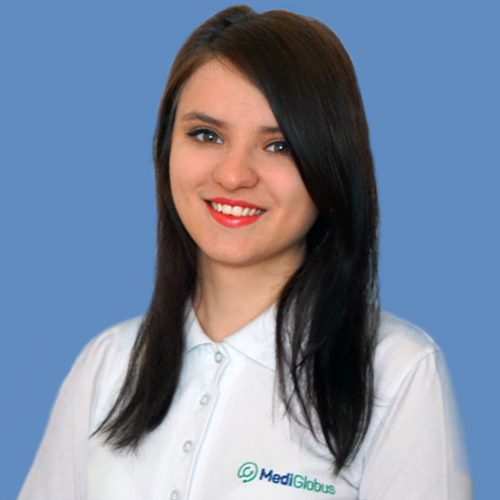“You never know when your story will inspire or help others,” say those who defeated the terrible disease. So today MediGlobus will tell you about examples of successful cancer treatment.
The Story of Little Lena with Retinoblastoma
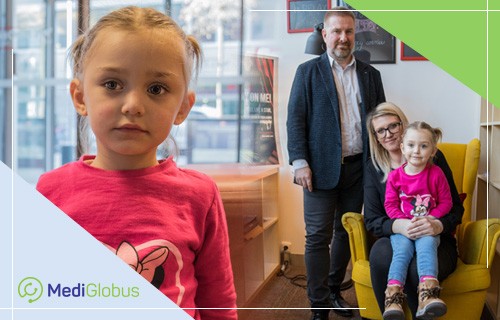
The baby’s mother noticed a problem with her eye last May: “Lena had a whitish reflection in the pupil on her right eye in several photos,” says Nikola, the girl’s mother.
During the examination at Motol University Hospital in June, the baby was diagnosed with retinoblastoma – eye cancer. Due to the seriousness of the diagnostic result, the doctors decided to immediately start cancer treatment. At first, the cytostatic substance was injected into the tumour area of the eye through a catheter inserted through the femoral artery. From autumn, the treatment was combined with cytostatics directly into the vitreous body of the eye.
In December, little Lena was given her last fifth injection of cytostatic. And the treatment worked! The number of tumour particles was significantly reduced, while the child’s vision and eyes were preserved. Of course, as in other similar cases, the girl will be under observation until she comes of age. But Lena’s family is happy that the therapy met their expectations and the child did not need to lose the eyes.
New cancer treatments
Cancer is one of the leading causes of death worldwide, and in the last decade much research has focused on finding new treatments with fewer side-effects. Among these innovations are:
Gene therapy | One of the newest technologies that involves injecting special genetic material into cancer cells. This process is done to repair a missing gene or to replace a mutated gene. As gene therapy is one of the most perspective ways to treat cancer, it is still in the clinical trial phase. |
Targeted therapy | It is a type of treatment that targets a specific area affected by cancer without harming the healthy organs. This greatly increases the specificity of the treatment, reducing its disadvantages. This type of therapy has proven successful in the treatment of melanoma, breast cancer, prostate cancer and oncohematological tumours. |
Nanotherapy | Nanomedicine offers the use of unique biocompatible and biodegradable systems that can precisely deliver conventional chemotherapy drugs into the tumour. These systems will increase the concentration of the drug in the pathological site without damaging healthy organs and tissues. Nanoparticles can be used for a variety of purposes, from diagnosis to therapy for rare cancers. Clinical trials have shown that nanoparticle therapy for cancer significantly improves efficacy and speeds up the healing process, while minimising side effects. |
Laser therapy | This method involves the use of a special high-intensity light beam instead of surgical instruments. An endoscope is used to deliver the laser light to the affected area. Laser therapy causes less bleeding and damage to healthy tissue. It is prescribed to shrink or destroy tumours or precancerous growths. Many types of cancer can be treated with laser therapy. Some of these are cancers of the vocal cords, cervix, skin, lungs and genitals. |
Personalised cancer vaccines | Vaccines are administered in the form of informational RNA, a molecule that instructs cells to make a specific protein, in this case a cancer antigen, which sets the immune system against the tumour. Clinical trials of personalised vaccines have shown that these drugs are particularly effective in certain types of cancer that contain a large number of mutations, such as lung and gut cancers. |
Cancer treatment for children abroad
Foreign clinics use modern methods of cancer treatment that are not available in countries with less-developed medicine. It takes a lot of time and paperwork to make an appointment at such a clinic on your own. MediGlobus can take care of this. To book an appointment with an experienced paediatric oncologist today, click on the “book an appointment” button.
The story of Rosemary Montbacci and Melanoma in Stage 4
Before Rosemary Monbacci found out she had melanoma, she spent 31 years as a nurse in the paediatric ward of a Pennsylvania hospital. She was used to taking care of patients and her large family, including her mother who died of esophageal cancer in 2007. Rosemary knew firsthand how devastating a cancer diagnosis can be for the individual and their family. The first symptom of the disease was swelling in her left leg. On ultrasound, doctors found enlarged lymph nodes and performed a biopsy that helped establish the diagnosis – stage IV melanoma.
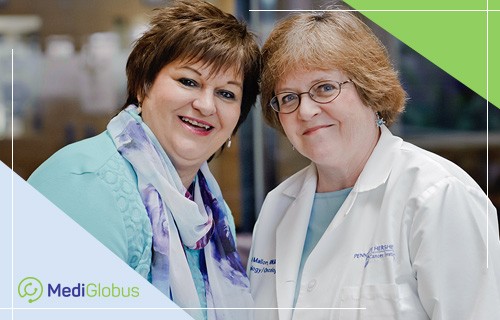
When she found out about the melanoma stage, Rosemary said she was sad and scared. She was concerned about the impact of her illness on her husband, daughter and other family members. Rosemary was worried that she would not survive, but after the initial shock, she was filled with determination to fight the cancer, to stay positive and strong.
The initial treatment plan included an operation to remove 17 lymph nodes followed by chemotherapy. Unfortunately, that was just the beginning. After only eight weeks, Manbachi’s cancer returned and spread quickly through her body. Rosemary then participated in clinical trials of a new immunotherapy drug, which also failed to yield positive results.
The next stage of treatment was a combination of several methods – immuno-, targeting and radiation therapy. Rosemary spent 2 hours daily for 4 weeks on this treatment. She was concerned about the side effects of the treatment but was glad that the tumor had not spread to the brain, liver, lungs and heart.
After almost a year of no response to any treatment, during Rosemary’s examination, doctors found no evidence of cancer in her body. In December 2013, she stopped taking her cancer medication and started to have checkups every 3 months. She now has these checkups every 6 months. Here’s some advice Rosemary gives to those who have have been diagnosed with cancer:
Find a team of medical professionals who specialize in your type of oncology.
Be aware of what type of cancer you have and what treatment options are available.
Keep a healthy diet and exercise regularly.
Have regular medical checkups.
Use all resources available for cancer patients in your community. Cancer health centers and hospitals offer support groups, exercise classes, massages and more.
Try to cope with stress and don’t let the little things bother you.
Enjoy every minute you spend with your family and friends and appreciate life.
Address others with cancer and tell your story because we get strength from each other.
Melanoma treatment abroad
The survival rate of melanoma patients at early stages abroad is up to 99%. Doctors effectively remove the tumour without causing unnecessary cosmetic damage. To book an appointment at an overseas clinic, click on the “Book an appointment” button
Sarah Whitlock’s story – a miracle cure for stage 4 lung cancer
In 2010, Sarah Whitlock was diagnosed with stage 4 non-small-cell lung cancer – a rare disease with a five-year survival rate of less than 3%. Despite her unfavourable diagnosis, she managed to beat stage 4 cancer, avoiding the after-effects of aggressive cancer therapy and enjoying life.
Upon hearing her diagnosis, the woman immediately began treatment and, like many patients in the final stages of cancer, enrolled in a clinical trial for a new drug. She underwent several courses of chemotherapy and radiotherapy for which she had a good response before she started taking the experimental drug, selpercatinib. This is a type of targeted therapy that can be used if a patient has a specific mutation in a gene called RET. The drug prevents cancer cells from growing and dividing.
Sara, like many other patients, showed a good response to the targeted therapy; in addition, the side-effects of the treatment were much milder than those of classic radiotherapy protocols.
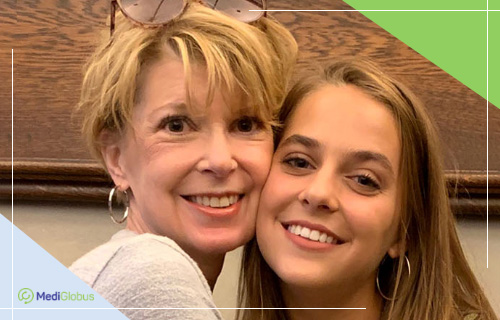
The drug was effective not only in treating the primary tumour but also the metastases that had formed in the woman’s body, particularly in her intestines. Thanks to the targeted therapy, she was able to avoid the traumatic surgery and put the tumour into remission.
“I feel fine,” says Sarah, “and I can do almost anything I want. Of course, hiking in the mountains and five-kilometre runs are out of the question, but I can spend time with my family and see my children go to college. Life is good!”. For more than 13 years since her initial diagnosis, the woman has been winning over her stage 4 lung cancer and has never stopped sharing her love and happiness with her loved ones.
In 2020, the FDA and the EU approved selpercatinib for the treatment of non-small cell lung cancer and thyroid cancer.
About Judy Perkins, who was cured of stage 4 breast cancer
At 49, Judy had breast cancer at the last stage. When the disease was first diagnosed, doctors decided to remove the mammary glands, but 10 years later the cancer returned and spread to other organs. There was a big tumor in Judy’s liver. Prognosis wasn’t too positive, counting months. She had seven courses of chemotherapy, but the treatment didn’t help her. Judy was desperate and preparing for the worst.
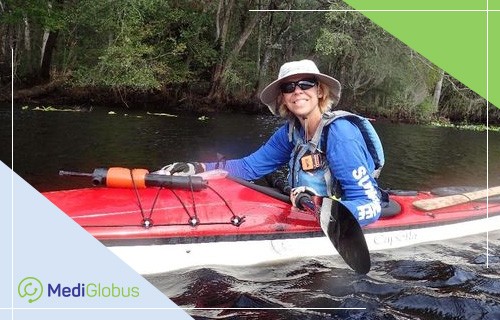
“I began to take all necessary measures to move from life to death. I handed over the property to my husband, got rid of my personal belongings and said goodbye to my family and friends – and most interestingly, I found peace along the way. I did not wait for death, it did not scare me. My biggest fear was that I would be hurt. But after a while, I learned that I could participate in clinical trials of a new cancer treatment.”
The doctors resorted to experimental therapy developed by scientists at the American Cancer Research Center (Maryland).
“Dr. Rosenberg’s genetic analysis of my tumor found 62 mutations responsible for the tumor malignancy. He then extracted the lymphocytes that could attack these genetic mutations, raised them in his lab and injected them back into my body. Then it was time to wait. I knew this experimental therapy had a low success rate, only about 14%. Besides, this treatment had never been used before for breast cancer. However, I was hoping for a miracle.
Ten days after the start of immunotherapy, the tumour in my chest decreased and eventually disappeared. Two months later, the tumors in the other organs also disappeared.
Closeness to death taught me to let go of events that I cannot control and gave me a sense of responsibility. Now I’m trying to help find a solution for people with cancer. Also I’ve resumed my active life – camping, kayaking. But I’m not taking anything for granted. I know how precious and dangerous life is, and how one tumor and one test can turn an active person into a dying person.”
Survival statistics for breast cancer
Prognosis of breast cancer treatment depends on the extent of malignant process, as well as the type, localization and size of the tumour. According to Cancer Research UK, at different stages of the disease the 5-year survival threshold is reached by the following number of patients:
Stage I – about 98%;
Stage II – about 90%;
Stage III – around 70%;
Stage IV – less than 25%.
Breast cancer treatment abroad
Breast cancer remains the No. 1 cancer among women. Foreign clinics can offer effective treatment, minimal complications and organ-preserving therapy. You can make an appointment for treatment abroad with MediGlobus. Click on “register for breast cancer treatment” and submit your request.
About Rhonda Walker’s fight with breast cancer
Rhonda M. Walker is the wife, mother of four children, deputy chairman of the Montgomery County Commission in Alabama, orator and writer. In December 2014, Rhonda was diagnosed with locally invasive breast cancer. And that’s what she says about that period:
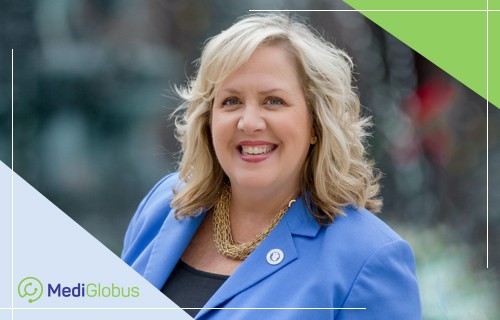
“A week before Christmas 2014, I was diagnosed with locally invasive breast cancer. I had two tumors in my right breast, two different types of cancer. One was the size of a lime, the other was the size of a penny. The exam showed cancer in several lymph nodes around my right breast. I needed an aggressive course of treatment.
First, I went through eight cycles of chemo to reduce the tumors. The first couple of courses were tolerable. And in the next chemo sessions, I was very tired, I had ulcers in my mouth, nausea and of course my hair fell out.
So I’ve had chemo, mastectomy and I’ve been prescribed radiation therapy to remove the remaining cancer cells. The same as with chemotherapy, at first it was easy and by the end of the course I felt side effects such as burning and pain in the irradiated area. When I came back to normal after the radiotherapy, I had reconstructive surgery.
It took me a year to fight cancer and I’m happy to say I won this fight! After 5 years, I still feel good… In fact, even better than good. Yes, I fight with grief and pain and fear every day. But despite what that cancer took away from me, it gave me a new perspective on life. Cancer was my reminder that life is short and tomorrow may not come. That understanding changed me. I no longer take life for granted. I don’t back down from problems and enjoy every moment with the people I love.”
We hope that stories like this will help you stay hopeful for a cure. Of course, the statistics on cancer survival can be frightening, but it is worth remembering about those who have coped with the disease. Medicine does not remain in one place, and the best scientists in the world are constantly looking for new ways to cure cancer.
Breast cancer clinics abroad
Acibadem Maslak Clinic in Turkey;
Navarra University Hospital in Spain;
SoonChunHyang Hospital in Korea;
Asklepios Hospital Network in Germany;
Memorial Ankara Hospital in Turkey;
Rambam Medical Centre in Israel;
Samsung Clinic in South Korea;
Rechts der Isar Uniclinik in Germany;
Liv Hospital chain in Turkey.
We hope that stories like these will help you to keep your hopes up for a cure. Of course, cancer survival figures can be frightening, but it is worth remembering those who have managed to cope with the disease. Especially as medicine continues to evolve and the best scientists in the world are constantly looking for new ways to treat cancer.
If you need help in finding a clinic for the treatment of oncology, contact Mediglobus’ consulting doctors. Specialists will help you find a doctor, collect medical records and arrange a trip to treatment abroad for free.





